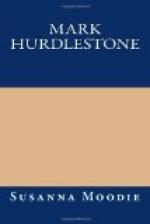“What do you mean?” cried Clary, starting from his arms, and gazing upon him with a distracted air. “While I have been idling in my bed something dreadful has happened. I read it in your averted eyes—on your sad, sad brow. Do not leave me in this state of torturing doubt. I beseech you to tell me the cause of your distress?”
“Clary, I cannot; I wish to tell you, but the circumstances are so degrading, I cannot find words to give them utterance; I feel that you would despise me—that all good men would upbraid me as a weak unprincipled fool; yet I call Heaven to witness, that at the moment I committed the rash act I thought not that it was a crime.”
“It is impossible, Anthony, that you could do anything unworthy of yourself, or that could occasion this bitter grief. You are laboring under some strong delusion, and are torturing yourself to no purpose. Frederic will be home to-morrow; he will counsel you what to do, and all will be right.”
“Frederic home to-morrow!” and Anthony gasped for breath.
“Oh, I am so glad. It seems an age since he left us. By the bye, I have a letter for you, which I quite forgot. It came this morning by the post. I am sure it is from my brother, for I know his hand.” Going to the mantel-shelf, Clary handed him the letter. Anthony trembled violently as he broke the seal; it ran thus:
“My Dear Anthony,
“I know not in what manner to interpret your unkind silence. Your failing to forward the money I left in your hands has caused me great mortification and inconvenience, and will oblige me to leave—to-morrow, without transacting the business that took me from home.
“Though I am certain that you will give me very satisfactory reasons for your non-compliance with my very urgent request, I feel so vexed and annoyed by it, that it makes me half inclined to quarrel with you. You would forgive this if you only knew what an irritable mortal I am. I advise you and Clary to frame some notable excuse for your negligence, or you may dread the wrath of your affectionate friend,
“Frederic.”
This letter, though written half in joke, confirmed Anthony’s worst fears. He imagined that Frederic suspected him of dishonorable conduct, although he forbore to say so in direct terms; and his repugnance to confess what he had done, to either Clary or her brother, was greatly strengthened by the perusal.
It was this want of confidence in friends who really loved him, which involved him in ruin. Had he frankly declared his folly and thrown himself upon Wildegrave’s generosity, he would as frankly have been forgiven; but pride and false shame kept his lips sealed.
He was a very young man—a novice in the ways of the world; and even in some degree ignorant of the nature of the crime, the commission of which had made him so unhappy. Instead of a breach of trust, he looked upon it as a felonious offence, which rendered him amenable to the utmost severity of the law. The jail and the gallows were ever in his thoughts; and worse than either, the infamy which would for ever attach itself to his name.




